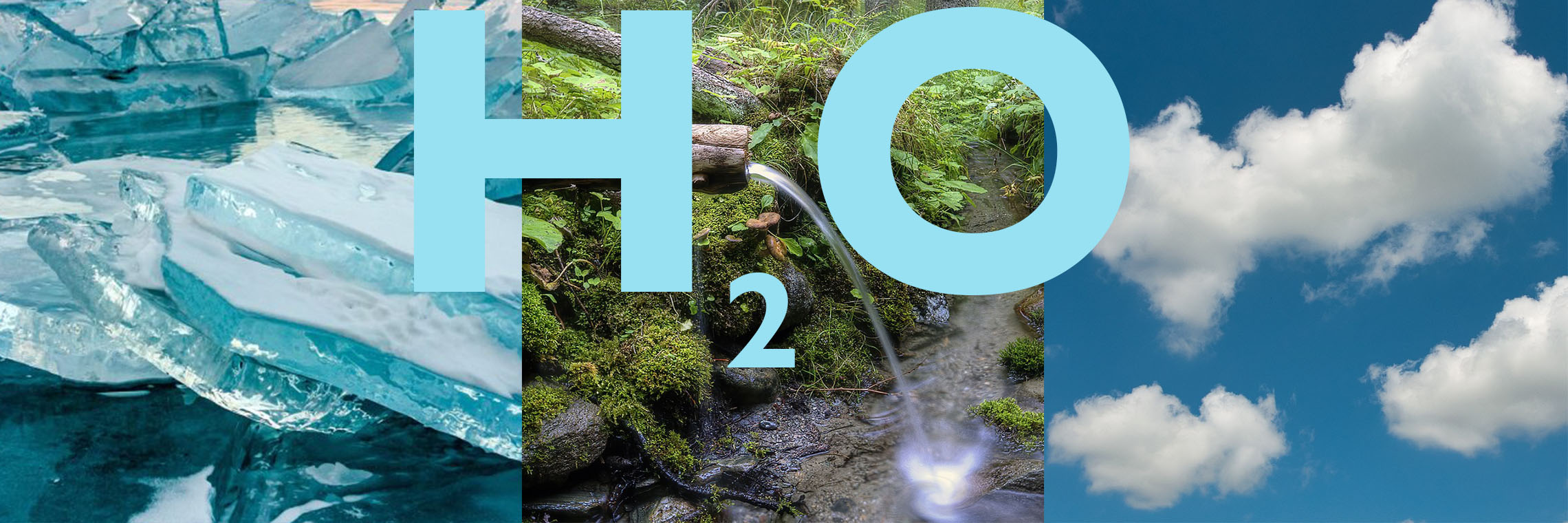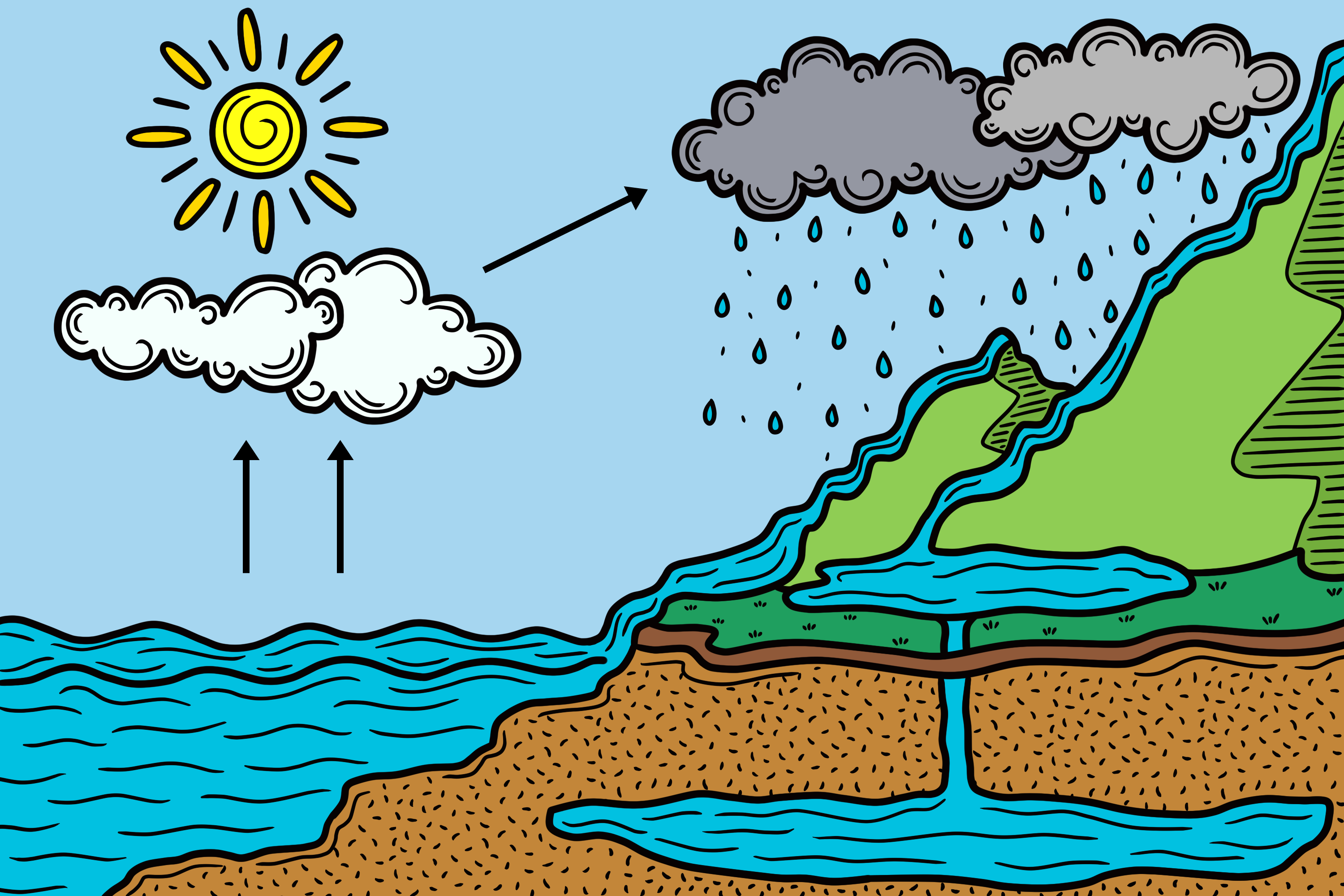



Water consists of one oxygen atom and two hydrogen atoms, which have combined to form a hydrogen molecule (H2O). These molecules are so tiny that they cannot be seen even with the most powerful microscope. Even a small drop of water contains many of these tiny compounds.
In Western schools we still learn that water originally comes from comets. These clumps of ice and dust hit the newly formed - and still very hot - planet. The ice melted, evaporated and later fell back to the earth as rain over thousands of years. Scientists still say this today because they have no other explanation for it. (as of January 2025)
Water and the human body.
An adult human being consists of around 70 percent water. Humans cannot exist without water. Humans can live 30 days without food, but only 3 days without water and only 3 minutes without oxygen (air).
Water can store information and emotions.
As the latest scientific research shows, water can absorb, store and release information and emotions.

Water and the climate
When water evaporates, clouds form that travel and rain down the stored water in other places. The water is thereby distributed over the entire earth - this is also referred to as the so-called water cycle. The high heat capacity ensures that water can store and release heat.
Water as a habitat for animals and plants
The ice at the North Pole and South Pole consists of fresh water (the land ice is an ice sheet, some kilometers thick, that was formed over thousands of years by the compaction of fallen snow - so the land ice is fresh water stored for a very long time, which provides a habitat for many living creatures. This Freshwater and saltwater in the seas, lakes and rivers represents an important habitat for many plants and animals.
Water as an energy transmitter Energy from water
Hydroelectric power plants use the energy of flowing water. The water is passed through a turbine, which begins to rotate under the pressure of the water and then passes its kinetic energy to a generator, which converts it into electrical energy.
Water as a solvent
Water as a solvent can be used to dissolve salts, but also chemicals such as ammonia and hydrogen chloride. This is important for many processes in chemistry and industry. Because of its polarity and ability to form hydrogen bonds, water is an excellent solvent.
The element of water
According to traditional Chinese medicine (TCM), the element water is associated with
Yin organ – kidney
Yang organ – bladder
Sensory organ – ears
Emotion – fear
Taste – Salty, bitter
Color: Dark blue like the sea
Season: Winter
Season Winter
In Chinese medicine, each season corresponds to a specific organ system. For example, spring corresponds to the liver. Summer corresponds to the heart and the small intestine, late summer to the spleen and stomach. Autumn corresponds to the lungs and the large intestine. In winter, the kidneys are the most important organ system. In other words, winter is a crucial time to strengthen and revitalize our kidneys. Each season is also determined by an element in nature. Spring is ruled by wood and is associated with birth. Summer is ruled by fire and is associated with growth. Late summer is ruled by the earth and is associated with transformation. Fall is ruled by metal and is associated with the harvest. Finally, winter is determined by the water element and is associated with storage. Water nourishes and is an essential substance for life. The wisdom of water is to flow effortlessly and take the form of what it contains. It has depth, darkness and a kind of mystery. A balanced water element can move smoothly and effortlessly throughout the season. The kidneys, which belong to the water element, are significantly involved in the conversion and transport of fluids in our body.
The emotion associated with water is fear. This includes fear and shock. Fear, in appropriate amounts, is essential to our lives as it ensures that we are careful and thoughtful in our actions. In excessive amounts we can experience many phobias and lack of courage. The importance of the kidneys cannot be overemphasized. The kidneys are the foundation of all other organ systems. They are often called the “gateway of life” because they store essence. The essence is also known as “Jing” in Chinese medicine. The kidneys regulate birth, growth, reproduction and development. Our essence determines our constitution, strength, vitality and longevity. It is the foundation of our sexual life and the foundation of sperm health in men and egg health in women. Nevertheless, insufficient essence can be a cause of fertility problems, impotence, physical or mental underdevelopment and premature aging.
Aging itself is due to a decline in our essence over time. Another reason to take good care of our kidneys is that the health of our bones, joints, teeth, ears, brain and marrow are influenced by the kidneys. So what can we do this winter season to take the best care of our kidneys? Rest and Self-Reflection As mentioned above, rest is crucial to rejuvenate the energy of our kidneys. Go to bed earlier and sleep longer. Going to bed early doesn't mean you have to wake up early. On the contrary. Try not to get out of bed until the sun comes up. Look within. Meditate, journal, pray. Practices such as yoga, tai chi and qi gong are ideal. Self-reflection, reading, writing, knitting, crafts, and other nourishing activities are so wonderful this season.
Keep your emotions calm
Stay as calm as possible and keep your peace of mind. Strong emotions drain energy from your body. In winter we want to preserve the energy in our body.
Best winter diet
Highly nutritious foods such as animal proteins are recommended such as beef, lamb, chicken, duck. Cook food longer and at a lower temperature and with water. Bone broth - especially because bones are connected to the kidneys. Root vegetables and beans help support the kidneys.
Heating the food
Turmeric, cinnamon, ginger, meat pot (soups), rice porridge hot pot. Avoid cold foods such as salads, sandwiches, sushi, smoothies Salty and bitter foods Salty and bitter foods are recommended in the winter months because they allow energy to sink and center in the body. This means that they increase storage capacity. Salty and bitter also cool the outside of the body and bring heat deeper and deeper into the body. Salty foods support the kidneys, while bitter foods cool slightly, helping to offset the very warm temperatures of the other foods recommended in the cold months to prevent excessive heat. The general rule of thumb when it comes to flavors is that a little supports the organ system, while excessive amounts damage that organ system. So try not to overdo the salty and bitter flavors. Some examples of salty foods include miso, soy sauce, seaweed, millet, barley as well as any foods that increase salt. This is easy to find in our modern diet as salt is already quite overused. Some examples of bitter foods are radishes/cabbage, citrus peel - warming and agitation, watercress, turnips, asparagus, carrots, rye, oats. The bitter taste is also the protective coating on foods such as citrus peels and the outer layer of cabbage. Black foods are helpful for the kidneys: black sesame, black beans, black rice, black pepper.
Helpful teas
Turmeric tea, orange tea, grapefruit tea allway with ginger and lemon
Other tips
Take things slowly. Be kind to yourself and others. Don't give your energy away if it doesn't feel right to you. Keep yourself warm, especially in your lower abdomen, lower back, and the soles of your feet. Drink warm teas, eat soups and stews.
Soak your feet in warm water bath for at least 30 minutes every evening. Wear proper clothing in winter; Not too thick to cause sweating because that can drain your Qi. Not too thin so as not to be cold.
